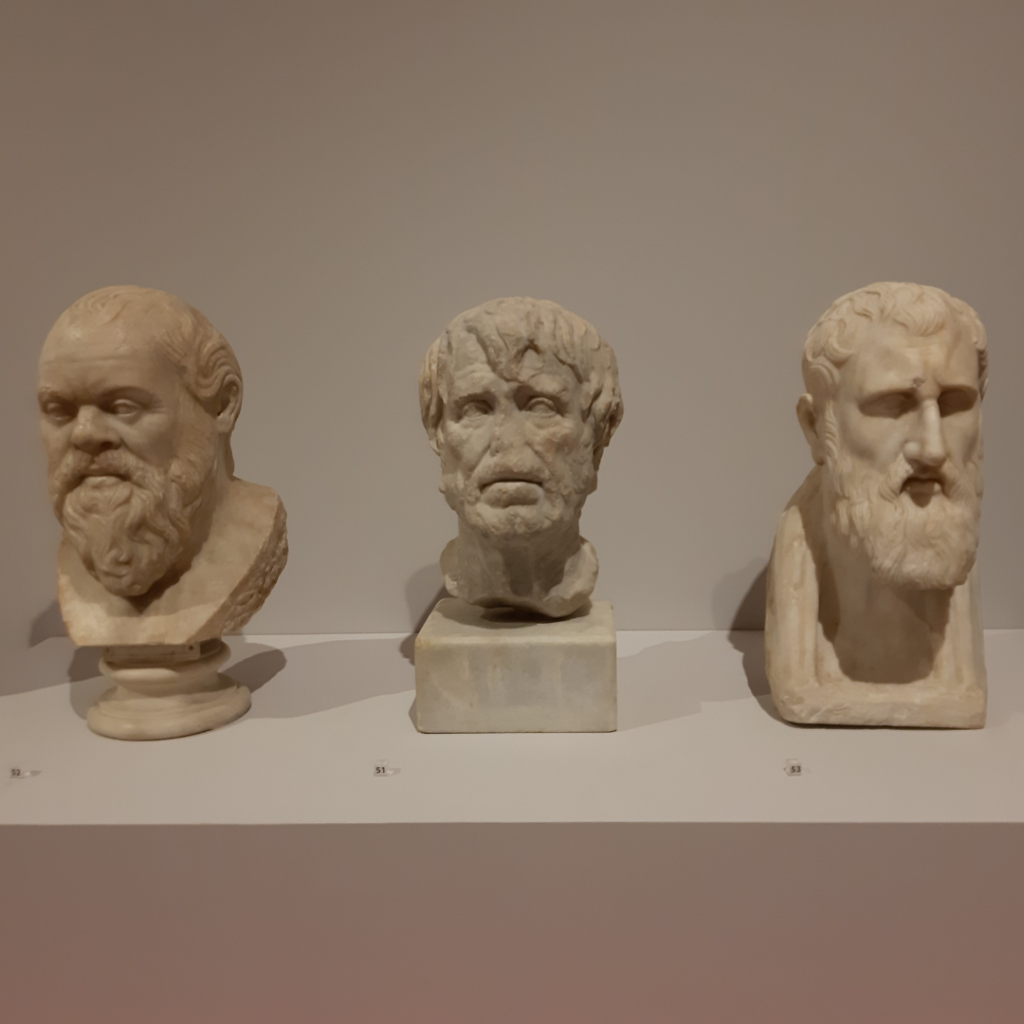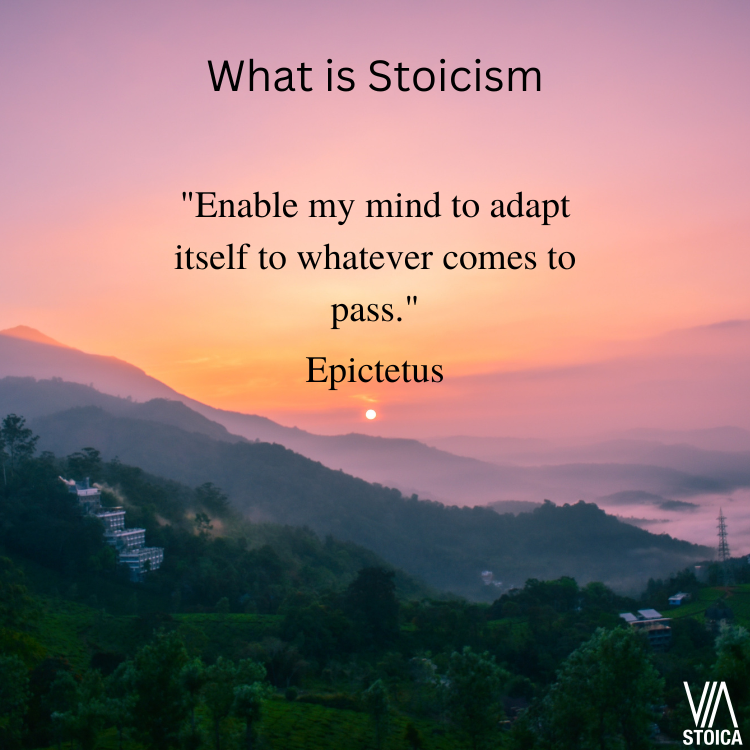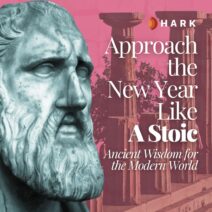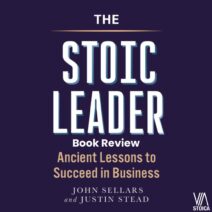What is Stoicism? A Practical Philosophy for Living Well
What is Stoicism? Stoicism is a Hellenistic philosophy from around the 3 century BC. With its goal to life a peaceful life by living a life of Virtue.

What is Stoicism?
Stoicism is an ancient and practical philosophy of life that teaches us how to understand ourselves and the world with reason, duty, and compassion. It invites us to examine our impressions, to think before we judge, and to live in harmony with nature. At its heart, Stoicism encourages the pursuit of virtue, the only true good, through wisdom, justice, courage, and temperance.
One of its most famous lessons is to focus on what lies within our control, but that principle is part of a much larger goal: to follow our moral choice and preserve our character and soul. To reach a state of Eudaimonia.
Watch the Via Stoica Podcast on What is Stoicism?
Originating in ancient Greece, Stoicism is still relevant today. Whether you are dealing with career stress, relationship issues, or simply looking for more meaning, this way of life provides grounded and actionable teachings. It is not about suppressing emotions or withdrawing from life. Instead, it offers a framework to cultivate inner peace, resilience, and moral actions in the face of life’s challenges. By keeping in mind our roles and duties, we can become positive and uplifting contributors to the world around us.
A Brief History of Stoicism
Stoicism began with Zeno of Citium (c. 334–262 BC), who founded the school after losing everything in a shipwreck. Searching for a better way of life, he found inspiration either through a prophecy, possibly from the Oracle at Delphi, or by picking up a book on philosophy in an Athenian bookshop. There, he encountered Crates of Thebes, a well-known Cynic philosopher, and began his training under him.
Over time, Zeno also studied with the Academics and Megarians before combining all of these ideas in his own system. He began teaching at the Stoa Poikile (“Painted Porch”) in Athens. That’s where his followers got to be known as Stoics.
- Early Stoics: Zeno, Cleanthes, Chrysippus
- Middle Stoics: Panaetius, Posidonius
- Roman Stoics: Seneca, Epictetus, Marcus Aurelius
Most of what we know about Stoicism today comes from the Roman period. Key texts include Seneca’s Letters and essays, Epictetus’ Discourses and Handbook (written down by his student Arrian), and Marcus Aurelius’ Meditations, a personal journal never intended for publication. But also the accounts of Cicero, although not a Stoic himself, give us deep insights into the philosophy.
Core Principles of Stoicism

At its heart, Stoicism is a guide to living in alignment with Nature and Reason. Here are its core principles:
1. Living According to Nature
Nature is rational and ordered. Our role is to align our lives with this greater order.
2. Virtue Is the Only True Good
The Stoics taught that nothing outside of our character can lead us to the good life or help us reach a state of Eudaimonia. Virtue consists of:
- Wisdom: using experience and knowledge to seek the truth and make the best possible moral choice
- Courage: acting on a moral choice, even when it is difficult, dangerous, or frightening
- Justice: knowing what is fair and doing what is right in your relationships and your role in the world
- Temperance: knowing your limits and choosing balance in thoughts, emotions, and actions by living in a disciplined way
3. The Dichotomy of Control
One of the most quoted ideas comes from Epictetus:
“Some things are up to us and others are not.”
Epictetus, Handbook, 1
This principle divides everything into two categories: what we can control and what we cannot. What we can control includes our judgments, choices, desires, and actions. What we cannot control includes our health, reputation, the behavior of others, and external events.
Rather than wasting energy on things outside our control, the Stoic path is to focus our effort inward. By doing so, we direct our attention toward the cultivation of virtue and the improvement of our character. Peace of mind follows when we accept the limits of our power and focus on our moral responsibility. It is not about passivity, but about understanding where we place our care and attention.
4. Logos and Rationality
Logos (λόγος) is the rational structure of the universe. It exists both in the cosmos and in us. By using reason, we participate in this divine order.
5. Impressions and Assent
This is the Stoic Workflow.
- When an event happens, we first receive an impulsive impression based on our beliefs, desires, aversions, and opinions.
- The wise person pauses to evaluate: What is really happening? Is my impression aligned with the objective truth? Should I assent to it? If unsure, we withhold judgment.
- Make the moral choice (prohairesis). To do what is required in the situation based on the truth and with virtue in mind.
This process allows us to act with clarity rather than impulse. It also reminds us that the event itself is neither good nor bad; it’s labeling that makes it so, and our moral choice based on this is what is good or bad. This is a foundational Stoic practice for developing self-mastery and emotional resilience.
Common Misconceptions About Stoicism
- “Stoics suppress emotions”: False. Stoicism teaches us to understand emotions, not eliminate them. Emotions are responses to our judgments and beliefs. Change the judgment and belief, and the emotion changes. Emotions are also mirrors and show us who we are and where our work lies.
- “Stoicism is passive”: Also false. Stoicism is an active philosophy; it teaches us to fulfill our roles, do our duty, and engage with life in a meaningful way.
- “Stoics reject material things”: They don’t. Stoics accept health, wealth, and success as preferred indifferents. We may prefer them, but they are not necessary for a good life. That’s why we can have material things, as long as they don’t own us.
How to Practice Stoicism Today
You don’t need to be a philosopher or scholar to practice Stoicism. Here’s how to start:

- Reflect daily: Use journaling or another way of reflection to examine your actions and thoughts
- Practice negative visualization: Imagine loss or hardship to strengthen gratitude
- Focus on what you can control: Let go of outcomes, focus on the process
- Embrace discomfort: Voluntarily challenge yourself to build resilience
- Read Stoic texts: Start with the ancients like Meditations, Handbook, or Letters from a Stoic, then go to more modern texts. Here is our Stoic Reading List for Beginners.
- Study your impressions: Pause before reacting. Take a deep breath and ask yourself what is really going on? What is causing my emotions, thoughts, or actions?
“To stop talking about what the good man is like, and just be one.”
Marcus Aurelius, Meditations, Book 10.16
Frequently Asked Questions (FAQ)
What is Stoicism in one sentence?
A philosophy that teaches us to live with reason, virtue, and nature to find peace and cultivate a good character.
Do Stoics feel emotions?
Yes. However, they strive to understand emotions and respond thoughtfully rather than react impulsively.
Is Stoicism religious?
No. While it includes spiritual elements (like Logos), Stoicism is a philosophy and is compatible with various worldviews.
Can anyone practice Stoicism?
Absolutely. Whatever walk of life you are in and the role you play, Stoicism offers practical tools for all.
Where should I start reading?
Try Marcus Aurelius’ Meditations, Epictetus’ Handbook, or Seneca’s Letters to Lucilius. Check out our Stoic Reading List for Beginners.
Learn More and Go Deeper
Want to explore Stoicism in more detail? Visit our dedicated pages for each of the main philosophers:
Want to explore more Stoic practices?
Book a free consultation with one of our Stoic Coaches to get support. Or read more about How to Practice Stoicism here. Listen to the Via Stoica Podcast on Spotify, Apple Podcasts, or YouTube.
Author Bio
Benny Voncken is the co-founder of Via Stoica, where he helps people apply Stoic philosophy to modern life. He is a Stoic coach, writer, and podcast host of The Via Stoica Podcast. With almost a decade of teaching experience and daily Stoic practice, Benny creates resources, workshops, and reflections that make ancient wisdom practical today.
Here is the Via Stoica Podcast episode on What is Stoicism?
Related Posts
-
 Greek Stoic Philosophy Terms
Greek Stoic Philosophy TermsWhat Is Ekklisis? The Stoic Art of Avoiding What Harms Your Character
What Is Ekklisis? Ekklisis in Stoicism is the rational refusal to engage with what would damage one’s moral choice. The Stoic meaning of ekklisis is important because it teaches us what to turn away from, not out of fear, but out of commitment to living well. In daily life, ekklisis helps us step back from […]
Read more -
 Via Stoica Podcast
Via Stoica PodcastA Hark Audio Curated Stoic Playlist for 2026
At the start of a new year, there is often an unspoken promise that things will somehow be different. Calmer. More ordered. More predictable. Yet life rarely follows that script. Delays disrupt flights, plans break down, people drift away, and life brings events we cannot control. What we can work on, and what Stoicism has […]
Read more -
 Book Reviews
Book ReviewsThe Stoic Leader by John Sellars and Justin Stead
The Stoic Leader introduces Stoicism as a practical philosophy and explores how its principles shape leadership, judgment, and character in both work and life. Summary Written by John Sellars and Justin Stead, The Stoic Leader offers what is effectively two books in one. Sellars provides an introduction to Stoicism and its philosophical foundations, while Stead […]
Read more


Comments 0